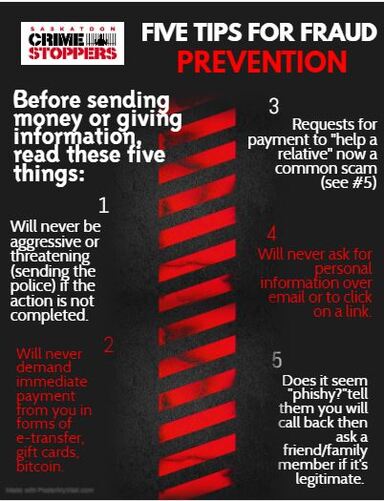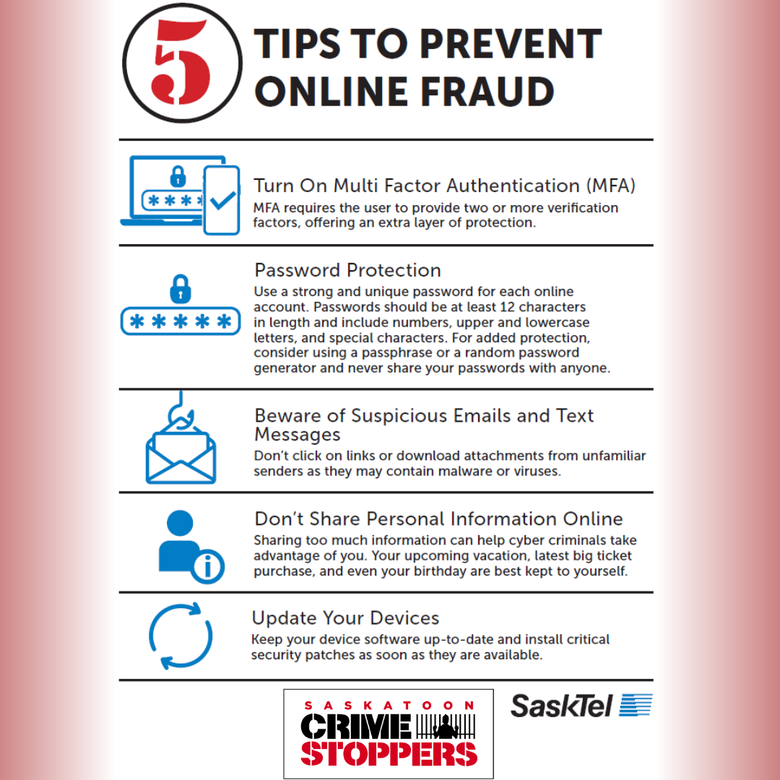March 2023: Fraud Prevention Month
March is Fraud Prevention Month, so we teamed up with SaskTel to provide a few TIPS for protecting yourself, and your loved ones, from cybercrime and phone scams.
This year, the Canadian Anti-Fraud Centre highlights a type of phone scam, referred to as the "Emergency-Grandparent" scam. Fraudsters call seniors pretending to be a family member in financial distress because of an emergency situation.
REMEMBER: NEVER send cash or other funds to unknown persons or bank accounts, the courts will NEVER ask for bail money for someone in custody, and be very suspicious of calls that requite immediate action. You CAN hang-up!
For more information on recent scams please visit: https://www.antifraudcentre-centreantifraude.ca/index-eng.htm
For more information about protecting yourself online please visit: www.sasktel.com/support
If you are a victim of an online or phone scam, please alert your financial institution and contract your local police agency to report the financial loss.
This year, the Canadian Anti-Fraud Centre highlights a type of phone scam, referred to as the "Emergency-Grandparent" scam. Fraudsters call seniors pretending to be a family member in financial distress because of an emergency situation.
REMEMBER: NEVER send cash or other funds to unknown persons or bank accounts, the courts will NEVER ask for bail money for someone in custody, and be very suspicious of calls that requite immediate action. You CAN hang-up!
For more information on recent scams please visit: https://www.antifraudcentre-centreantifraude.ca/index-eng.htm
For more information about protecting yourself online please visit: www.sasktel.com/support
If you are a victim of an online or phone scam, please alert your financial institution and contract your local police agency to report the financial loss.
Crime Prevention Tips
Saskatoon Crime Stoppers recognizes that even if all of these tips are followed, crimes may still occur, however; we would encourage you to use these tips to help limit opportunity from those individuals committing crimes.
Vehicle Break-Ins
- Remove all valuables from the vehicle
- Close and lock all windows and doors
- Try to park in well-lit areas
- If possible, have exterior and/or motion lights on your residence or lighting up your driveway/parking area
- Remove spare sets of keys from the vehicle
- Secure tool boxes with locks
- Remove any identification cards and/or registrations from the vehicle
Residential and Business Break-Ins
- Before leaving, check to see if all doors and windows on your property are locked and secured.
- Remove garage door openers from vehicles.
- Install exterior and/or motion lights to illuminate the area if possible.
- If financially able to, install an alarm system and/or exterior cameras for both garage and house doors and windows.
- Keep a record of information for bicycles, tools, electronics, etc. (See Property Information Sheet for a reference).
- Consider marking tools and equipment with permanent initials or engravings.
- If away for a significant period of time, ask someone that you know to come by and check the property, gather any front door mail and to shovel the snow.
Remember to report any suspicious vehicles or persons in your neighborhood to your local law enforcement. Without any interaction, attempt to provide the police with a description or license plate numbers.
Saskatoon Crime Stoppers is able to provide front door stickers and exterior signs to place on businesses to assist as a visual deterrent. For further information to learn how Saskatoon Crime Stoppers can work with your company to help promote a safer community, please contact the Coordinator at [email protected].
Saskatoon Crime Stoppers is able to provide front door stickers and exterior signs to place on businesses to assist as a visual deterrent. For further information to learn how Saskatoon Crime Stoppers can work with your company to help promote a safer community, please contact the Coordinator at [email protected].
Fraud Prevention
Sent a Link? THINK!
Have you received a text message/email that seems odd? If it looks "fishy" then it probably is "phishy!"
Sent a Link? THINK!
Have you received a text message/email that seems odd? If it looks "fishy" then it probably is "phishy!"
When fraudsters send a link through email or over text, they are trying to direct you to a fake website to obtain your personal information. This is what is referred to as "Phishing." By clicking on the fraudulent link, fraudsters are able to gain access to private information or have remote access to the device. Clicking on one of these links, or opening an attachment, can also install possible viruses or spyware on the device without any warning to the user.
Here are some tips to when dealing with possible link scams:
- Be sure to check the sender's email address to see if it looks legitimate. Fraudsters will often change a letter or add different symbols to the email address so that it appears similar to the original.
- Hover your mouse over the link to see if you are being sent to a different site then where the email came from.
- Do not open links that are sent to your email or phone unless you can be sure that it came from a reputable source.
- Do not respond to any requests for sensitive information over email or text. Legitimate organizations will never ask for personal data or payment through unconventional methods like gift cards or E-transfers.
The following is an example of a recent fraudulent scam to be aware of:
A caller will identify themselves as an officer with the Canada Revenue Agency. They will inform you that your personal information, like
your SIN, has been involved in criminal activity and will attempt to verify personal information from you. They will ask you who your
local police department is and will inform you that a police officer will call you back. The caller is then able to mimic the police
department's phone number and will call the victim from the number posing as a Police Officer.
- If you receive a call that you are unsure of, ask the caller their name, the agency they work for, and a call-back number. Do your own research before providing any of your personal information online. If the business is legitimate, you can always call them back. If the call is a scam, this is usually when they will become aggressive or threatening with their demands (which is another red-flag).
If you have an example or information regarding a fraudulent phone number or email address, please feel free to contact us at 1-800-222-8477 or by clicking on the "Leave a Tip" tab at the top of the page to leave an anonymous tip.
Some Examples of "Fraudulent" Calls:
Received a call from a United States number. Caller stated that they were calling from the Canadian Government Crime something or other. They informed me that there had been a violation with my social insurance number.
Received a call from number starting with 306-229. Caller stated that they were calling from the Fraudulent Department of the Bank of Canada. It was a computer recording saying that there is a warrant out for your arrest and to press 1 for further details. After pressing 1, a call-back number was requested to the caller, at which point the caller immediately hung up.
Received a call from an Illinois, USA number. Caller stated that they were calling from Service Canada and that my social security number had been involved in a fraudulent case. The caller also informed me that the RCMP are involved and to press a number to proceed and to avoid.. (hung up).
Received a call from a number starting with 1-845. Caller stated that they were calling from a tech support company and that the person's computer was downloading wrong information and that they were calling to help.
Submitted July 2020.

"Five for Fraud"
Here are the “Five Tips for Fraud Prevention” that we have compiled for you. After much research and through feedback, these are the five “red flags” that seem to be consistent across the board. Before you commit to a payment, let these tips help guide you in your decisions. Feel free to write or print these out for your parents, grandparents, or yourself as little reminders when dealing with odd phone calls and/or emails.
- 1. Is someone calling you and being aggressive or threatening? Legitimate callers (government, agencies, or other credible institutions) will never be aggressive with their language, or threaten to send the police if action is not taken immediately.
- 2. Is someone calling demanding immediate payment in the forms of an e-transfer, gift cards, iTunes, or bitcoin? Legitimate callers would never demand that, “pay right this second” attitude over the phone or through email. They would also NEVER ask for these types of payments. These types of payments should be an immediate red flag.
- A common scam is now being referred to as the “Grandparent” scam. Even with the current COVID-19 situation, callers are claiming to need immediate payment to help assist one of your relatives. The callers are claiming to be hospital officials, family members travelling, or friends of family members requesting money right away to help that family member with an emergency. If this is the case, and you can’t be sure of who is calling, hang up and check with a family member yourself.
- If you receive an email that is requesting personal information by clicking on a link, DO NOT click on the link. Legitimate businesses and institutions will never send you an email asking for personal information through a link.
- Does the call seem odd? Then it probably is. Trust your gut. Tell them you will call them back (which will result in them doing #1 or #2, which is great for you knowing it’s a scam) and then consult with a family or friend about its legitimacy.
- Submitted March 27, 2020.

